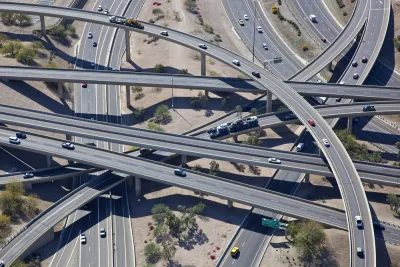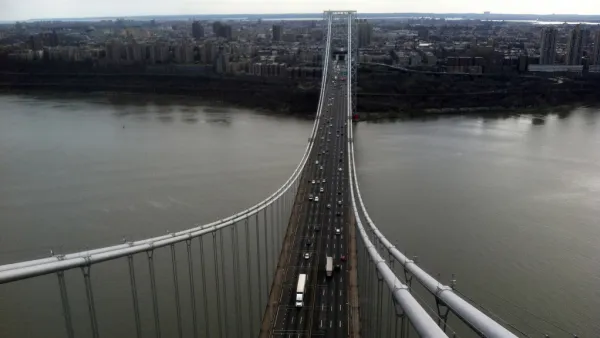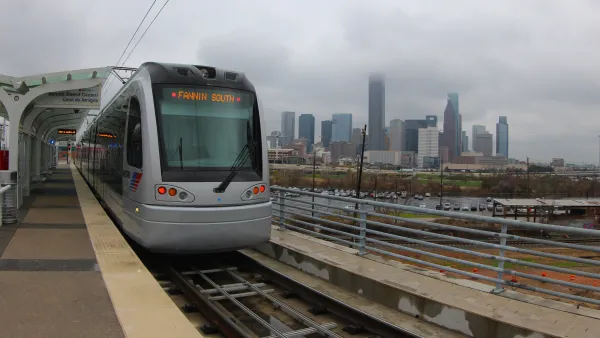An agreement laid out last week by the White House and Republican lawmakers makes dramatic cuts to funding for public transit, rail, and "human infrastructure" projects while leaving highway funding almost intact.

Last week, President Biden and congressional leaders announced their agreement on the Bipartisan Infrastructure Framework, a compromise that retains some of the programs proposed in the American Jobs Plan while also appealing to a sufficient number of Republican lawmakers. The Framework proposes $579 billion in new spending, largely directed to road, bridge, and highway projects. It also slashes the proposed budget for many of the American Jobs Act's social and climate change-related programs, completely eliminating funding for much of what President Biden called "human infrastructure," such as housing, schools, and childcare, and dramatically cutting spending on public transit, rail, electric vehicles, and clean water infrastructure.
While the White House calls the proposal "the largest long-term investment in our infrastructure and competitiveness in nearly a century," critics express disappointment with the drastic reduction in spending on some programs. "Hard to believe these initiatives would be adequate to counter the devastating climate impacts" of the over $400 billion in road funding, says Yonah Freemark of the Urban Institute. Matt Yglesias argues that "there's just no reason to believe that the existing surface transportation funding levels in the United States are inadequate." Mitchell Bernard, president of the Natural Resources Defense Council (NRDC) calls the deal "a modest start toward fixing America’s crumbling infrastructure," calling for Congress to "finish the job by passing the American Jobs Plan, which will drive an equitable recovery with climate action and job creation in a moment we need all of them."
Although legislative language has yet to be finalized, the agreement published by the White House last week proposes $201 billion in water, sewer, power, and environmental remediation projects, $65 billion for broadband infrastructure, $47 billion for resilience projects meant to mitigate the growing effects of sea level rise and extreme weather, $49 billion for public transit, and $15 billion in spending on electric vehicle infrastructure (including President Biden's goal of building a network of 500,000 EV charging stations). According to Matthew Choi of Politico, "that's still less than the White House’s original $174 billion EV proposal, and several of progressives’ biggest climate asks were noticeably absent, including a clean energy standard or Civilian Climate Corps." The proposal also includes $66 billion for passenger and freight rail, $5 billion for the crucial issue of Western water storage, and $1 billion for what the bill calls "reconnecting communities," all significantly lower figures than proposed in the American Jobs Plan. The plan provides $109 billion for roads and bridges–this in addition to the $303.5 billion proposed by the Surface Transportation Reauthorization Act of 2021, introduced in May.
Funding for the proposed programs would come from a patchwork of sources such as enhanced IRS enforcement, the repurposing of unused COVID-19 relief funds, and a new Infrastructure Financing Authority, a federal agency designed to incentivize private investment. According to the White House's fact sheet, the Framework is also financed by "targeted corporate user fees, and the macroeconomic impact of infrastructure investment." A hike in the corporate tax rate, which is part of Biden's American Jobs Plan proposal, is conspicuously absent from the revised agreement. "In the pursuit of enough Republican votes to clear a Senate filibuster," writes Jim Tankersley in the New York Times, "the deal excludes all the president’s proposals to more heavily tax corporations and the rich, much of his push to curb climate change and all his proposed investments in the 'human infrastructure' of education, paid leave and child and elder care."
President Biden praised the compromise, saying "[i]t reflects consensus," but the President, House Speaker Pelosi, and Senate Majority leader Schumer vouched that to pass, the Framework would have to be accompanied by additional legislation that addresses Democrats' concerns. Yet the sweeping cuts made in the Framework leave many wondering whether the downsized programs will live up to the promises laid out in the American Jobs Plan.

Analysis: Cybertruck Fatality Rate Far Exceeds That of Ford Pinto
The Tesla Cybertruck was recalled seven times last year.

National Parks Layoffs Will Cause Communities to Lose Billions
Thousands of essential park workers were laid off this week, just before the busy spring break season.

Retro-silient?: America’s First “Eco-burb,” The Woodlands Turns 50
A master-planned community north of Houston offers lessons on green infrastructure and resilient design, but falls short of its founder’s lofty affordability and walkability goals.

Test News Post 1
This is a summary

Analysis: Cybertruck Fatality Rate Far Exceeds That of Ford Pinto
The Tesla Cybertruck was recalled seven times last year.

Test News Headline 46
Test for the image on the front page.
Urban Design for Planners 1: Software Tools
This six-course series explores essential urban design concepts using open source software and equips planners with the tools they need to participate fully in the urban design process.
Planning for Universal Design
Learn the tools for implementing Universal Design in planning regulations.
EMC Planning Group, Inc.
Planetizen
Planetizen
Mpact (formerly Rail~Volution)
Great Falls Development Authority, Inc.
HUDs Office of Policy Development and Research
NYU Wagner Graduate School of Public Service





























